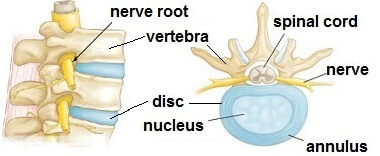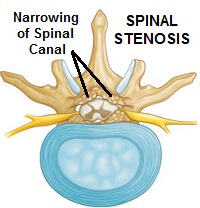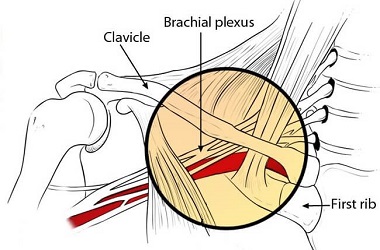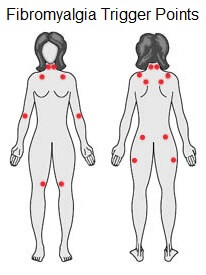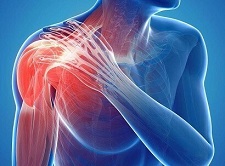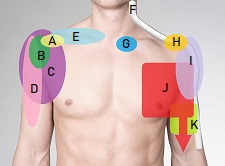- Home
- Diagnosis Guide
- Burning Shoulder
Burning Shoulder Pain
Written By: Chloe Wilson BSc (Hons) Physiotherapy
Reviewed By: SPE Medical Review Board
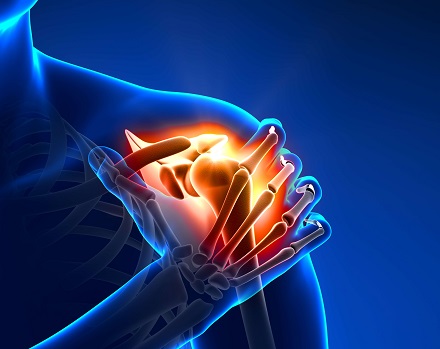
Burning shoulder pain is a common problem and can be extremely unpleasant.
It may be there constantly or come and go, affect a small area or travel down the arm or even in to the neck or back. It often affects how well you sleep.
Burning shoulder pain may be caused by a problem in the shoulder joint or surrounding tissues, however in most cases, it is actually related to a problem in the neck, even if there are no neck symptoms.
Here we will look at the most common causes of burning pain in the shoulder and the common features of each, such as associated symptoms and typical age groups affected.
This will help you identify which one is most likely to be the cause including how to tell whether it is a shoulder problem or actually something wrong in the neck, a common cause of burning shoulder pain.
Neck vs Shoulder Problems
Here is a simple guide to help you work out if your burning shoulder pain is due to a shoulder problem or a neck problem:
Neck Problems
Pain in neck, shoulder and/or down arm, often into wrist and hand
Stabbing, burning, tingling, numbness, weakness
May persist during rest
Worsens with neck movements
Eases at night
Shoulder Problems
Pain mainly in shoulder or upper arm, not usually below the elbow
Dull, aching, catching, stabbing pain, but sensation unaffected
Eases with rest, worsens with movement
Worsens with shoulder movements
Persists at night
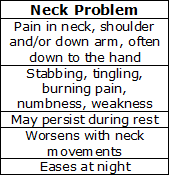 |
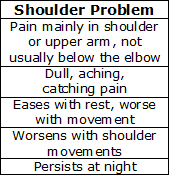 |
Causes Of Burning Shoulder Pain
Burning shoulder pain can be caused by:
- Neck/Nerve Problems: Disc Disease, Spinal Stenosis, Brachial Neuritis, Neck Arthritis
- Shoulder Problems: Bursitis and tendonitis
- Medical Conditions: Fibromyalgia, Restless Arm Syndrome, Gall Bladder problems, Shingles & Heart Attack
As most cases of burning pain in the shoulder tend to be due to an issue in the neck, we will start there, and then go on to look at possible shoulder problems or other medical conditions that can cause burning shoulder pain.
Neural Problems
Often, burning pain in the shoulder is actually caused by a problem in the neck or surrounding nerves. Even if you haven’t noticed any pain or stiffness in the neck itself, it may be what is called “referred pain”, meaning that the pain is felt in a different location to the source of the problem.
The neck is made up of seven bones, known as vertebra. Between the bones sit the spinal discs, spongy material that provide cushioning and shock absorption through the spine.
The spinal cord runs down through a hole in the vertebra and off it branch a complex network of nerves that travel across the shoulder and down the arm to the hand.
If a nerve is irritated, for whatever reason, it can lead to abnormal sensations anywhere along the path of the nerve. A common symptom of nerve irritation is burning shoulder pain, but there may also be tingling, pins and needles, numbness and/or weakness. These abnormal sensations may be felt anywhere along the path of the nerve, known as referred pain or radiculopathy. Nerve irritation is the most common cause of pain from shoulder to hand.
Burning shoulder pain is typically due to nerve irritation from one of the following:
1. Disc Disease
Pressure on the nerve root due to problems in the disc is a common cause of burning pain in the shoulder. Shoulder pain from disc disease may be caused by:
Disc Bulge: When the nucleus (the central part of the disc) bulges, placing pressure on the nerve root and causing irritation
Disc Herniation: When the disc leaks out through a tear in the annulus, irritating the nerve root and sensitizing the nerve
Disc Degeneration: Discs dehydrate and become thicker as we age which can lead to instability and inflammation at the nerve root
Burning shoulder pain that is due to disc disease in the neck usually:
- Affects one arm (occasionally it may affect both arms), spreading further down the arm over time
- Worsens when you cough or sneeze as those movements increase the pressure in the discs
- Worsens with certain neck movements as the disc gets squashed
- Is accompanied by other symptoms such as pain, tingling/pins and needles, an “ant-like crawling" sensation or even numbness
- Is worse first thing in the morning as discs “plump up” slightly overnight (due to less pressure on the discs when you lie down), increasing the size of the bulge
- Is not affected by arm movements i.e. moving the arm doesn’t bring on the pain unless the movement places the nerve under tension
- Comes on gradually (disc degeneration or disc bulge) or suddenly (disc bulge or herniation) from an injury such as heavy lifting
- May or may not be accompanied by neck pain
- Disc bulge/herniation usually affects people aged 30-50, disc degeneration typically affects those over 60
2. Spinal Stenosis
Spinal stenosis is another possible cause of burning shoulder pain. This is when there is abnormal narrowing of the spinal canal, the gap in the spine for the spinal cord. This places increased pressure on the spinal cord and nerve roots.
Symptoms of spinal stenosis usually start to appear when the spinal canal space has decreased by around 30%. Limited space at the side of the canal affects the nerve root, whereas central narrowing affects the spinal cord.
Burning shoulder pain due to spinal stenosis usually:
- Starts gradually rather than suddenly
- May refer down the arms and legs
- Affects both arms
- Worsens when flexing the neck (looking down) or standing
- Affects hand function making activities such as writing or cutting food difficult
- May be accompanied by weakness, pins and needles, numbness, pain and heaviness in the arms
- In severe cases may affect bladder and bowel function, cause balance problems or paralysis
- Affects those over the age of 50
Cervical stenosis can be extremely serious if there is too much narrowing of the spinal canal and the spinal cord is affected. In severe cases, surgery may be needed.
3. Brachial Neuritis
Brachial neuritis causes weakness and a sharp, burning pain in the shoulder, shoulder blade, arm and hand.
It is caused by inflammation of the brachial plexus, a collection of nerves that travel from the lower neck, across the front of the chest, to the arm pit.
Brachial neuritis can be a hereditary condition, i.e. from a gene mutation, or due to a problem in the immune system e.g. following an illness, surgery or immunisation.
Burning shoulder pain symptoms from brachial neuritis typically include:
- Comes on suddenly, usually at night, with immediate severe, sharp, stabbing, burning pain in shoulder
- Is constant – never settles
- May spread down the arm as far as the hand
- Usually only affects one arm
- Gets worse with arm movements
- Is worse at night time
- Arm weakness may develop after a few weeks making it hard to move the arm
- May be accompanied by tingling or numbness in the arm or occasionally shortness of breath
- Affects more men than women
- Most common in young/middle aged adults, can affect children
Treatment usually involves a combination of strong painkillers, physical therapy and exercises. Find out more about the causes, symptoms and treatment options in the Brachial Neuritis section.
4. Cervical Arthritis
Neck arthritis, aka cervical arthritis or cervical spondylosis, is another possible cause of burning pain in the shoulder caused by wear and tear of the neck bones and discs. As we age, discs start drying out, become weaker and lose height. The smooth surface on the bones gradually wears away and bone spurs form, narrowing the space around the vertebrae which can place pressure on the surrounding nerves.
Neck arthritis is extremely common affecting around 80% of people over the age of 60, but many of those don’t experience any noticeable symptoms.
Cervical spondylosis typically presents with the following picture:
- Neck pain that radiates to the shoulder and/or shoulder blades often described as a nagging ache or toothache type pain. If there is pressure on the surrounding nerves there may also be burning shoulder pain
- Neck stiffness e.g. may not be able to turn your head as far to one side
- Symptoms usually worse in the morning, ease with initial movement, but may then get worse towards the end of the day
- Symptoms ease with rest
- Aggravated by neck movements
- Grinding noise with neck movement
- May be accompanied by headaches
- Most common over the age of 60
Most cases of cervical spondylosis respond well to medication and physical therapy.
You can find out loads more about how neck problems cause burning shoulder pain in the arm nerve pain section.
Shoulder Problems Causing Burning
Whilst most cases of burning shoulder pain come from the neck, it may also be indicative of a problem in the shoulder itself.
The two most common shoulder problems that cause burning pain in the shoulder are:
1. Shoulder Bursitis

Burning pain in the shoulder that is fairly localised may be from shoulder bursitis.
Bursa are small fluid-filled sacs that sit between soft tissues and bones, allowing smooth, friction-free movement.
Irritation of the bursa from excessive pressure, injury or repetitive friction can lead to inflammation which can cause burning shoulder pain.
There are a number of different bursae located around the shoulder and shoulder blade which may be affected. The most common types are subacromial bursitis (top/front shoulder pain) and scapulothoracic bursitis (shoulder blade pain)
Burning shoulder pain from bursitis tends to:
- Be a low level aching and burning pain in shoulder which gets progressively worse
- Develop gradually over time unless there was a specific injury
- Be fairly localised (i.e. over a specific spot) – may start to spread as the condition worsens but will not refer pain below the elbow
- Get worse with arm movements particularly when the arm is raised above shoulder height
- Get worse when there is pressure on the bursa e.g. lying on your side
- Affect sleep causing frequent waking
- Lead to weakness and stiffness in the arm over time
- Take several weeks/months to settle
- Can occur at any age
Burning shoulder pain from bursitis usually responds well to rest, physical therapy, exercises, injections and anti-inflammatory pain medication. Find out more about the causes, symptoms and treatment options in the shoulder bursitis section.
2. Shoulder Tendonitis
Another cause of burning shoulder pain is tendonitis when there is degeneration and or inflammation in one of the muscle tendons. The most common types of tendonitis to cause burning shoulder pain are:
- Supraspinatus Tendonitis: causes pain at the top of the shoulder and down the outer arm
- Biceps Tendonitis: causes pain at the front of the shoulder and upper arm
This is usually caused by repetitive friction on the tendon, usually from repetitive activities such as throwing, racket sports or manual labor, excessive pressure from the surrounding structures e.g. bone spurs, muscle weakness and/or poor posture.
Symptoms of shoulder tendonitis usually include:
- Diffuse aching/burning shoulder and upper arm pain with a localised sharp pain when moving the arm. Does not refer symptoms below the elbow
- Worse when raising the arm above shoulder height or when moving the arm against resistance (try moving your affected arm out to the side while stopping the movement with your other hand – if there is pain, it may well be tendonitis)
- Develops gradually over time due to repetitive wear and tear and gets progressively worse
- There may be accompanying crepitus with arm movements (grating, clicking, grinding noises)
- Tender to touch over the affected tendon – location will vary depending on which tendon is affected
- Can occur at any age
Burning pain in the shoulder from bursitis or tendonitis usually responds well to rest, physical therapy and strengthening exercises – visit the shoulder exercises guide for exercises that can help.
Other Causes of Burning Shoulder
There are a few other conditions that can cause burning shoulder pain:
1. Fibromyalgia
Fibromyalgia is a condition where a chemical imbalance in the brain and problems in the way the central nervous system processes pain signals lead to widespread aching/burning pain, hypersensitivity, stiffness and fatigue.
Fibromyalgia commonly affects people between the ages of 30-50.
Burning shoulder pain from fibromyalgia will usually be accompanied by pain in a number of other joints as well as shown on the diagram here.
2. Restless Arm Syndrome
Restless arm syndrome is a condition where there is a problem in the central nervous system which causes abnormal movements e.g. spontaneous jerking movements and strange sensations such as crawling, tingling and burning shoulder pain.
Usually affects both arms and may also affect the legs. Find out more in the Restless Arm Syndrome section.
3. Gall Bladder Problems
The gall bladder is a small sac that stores bile from the liver. Problems in the gall bladder such as inflammation or gallstones can cause burning pain in shoulder.
Symptoms of gall bladder problems include intense abdominal pain which may refer to the shoulder, particularly around the right shoulder blade, chest pain, nausea and heart burn and often feel worse after eating.
4. Shingles
If your burning shoulder pain is accompanied by a rash, it may be that you have shingles. The pain may be quite intense. Only one side of the body will be affected.
5. Heart Attack
Burning shoulder pain accompanied by chest pain, usually a tight, crushing pain, shortness of breath, dizziness, nausea and sweating may indicate a heart attack. A heart attack is a medical emergency – seek medical assistance immediately.
6. Sleeping Awkwardly
Burning shoulder pain that starts when you wake up may be due to having slept awkwardly. One of the shoulder muscles or nerves in the neck may have been irritated causing burning pain in shoulder. The pain will usually settle down after a few hours/days – gentle stretching exercises can help.
RELATED ARTICLE: Shoulder Pain At Night - Causes, Treatment & Prevention
7. Muscle Fatigue
Delayed onset muscle soreness (DOMS) can cause burning pain in the shoulder. If you have suddenly increased you activity level or taken up a new sport, this may be the problem.
Burning Shoulder Pain Treatment
The best treatment for burning shoulder pain will depend on what the underlying cause is.
If the burning pain in your shoulder is due to a neck problem, physical therapy is often advised to work on strengthening and stretching exercises as well as postural advice and upper back stretches. In the arm nerve pain section you can find out lots more about how problems in the neck and nerve cause shoulder and arm pain and how to treat them.
If your burning shoulder pain is due to a problem in or around the shoulder then treatment will likely involve a combination of:
- Rest: from aggravating activities
- Ice: to reduce inflammation and pain
- Strengthening Exercises: to improve the strength and control around the shoulder
- Stretching Exercises: to improve the flexibility and mobility of the shoulder
- Stability Exercises: to improve the stability and control around the shoulder and shoulder blade
- Physical Therapy: treatments such as electrotherapy, rehab programs and taping
Any new incidence of burning shoulder pain should be checked out by your doctor to enable a clear diagnosis and effective treatment.
Burning Shoulder Pain Summary
Burning shoulder pain is a common problem usually caused by a problem in the neural system or the shoulder itself.
Burning shoulder pain from a nerve problem will often extend down the arm, may be accompanied by tingling and numbness, often persists when resting, eases at night and gets worse with neck movements.
Burning shoulder pain from shoulder problems is mainly confined to the shoulder and upper arm, is a dull, catching or stabbing pain, eases with rest and worsens with arm and shoulder movements and persists at night.
Common shoulder problems that cause burning shoulder pain are bursitis and tendonitis.
If you need more help working out what is wrong with your arm, visit the shoulder pain diagnosis section or check out our shoulder pain diagram charts.
You may also be interested in the following articles:
- Front Shoulder Pain
- Upper Arm Pain
- Shoulder Pain At Night
- Shoulder Clicking & Popping
- Elbow Pain Diagnosis
Related Articles
Page Last Updated: November 5th, 2024
Next Review Due: November 5th, 2026
